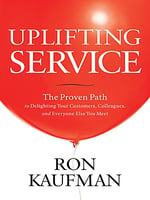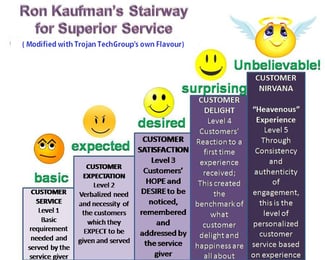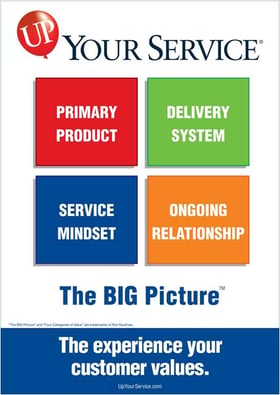 What’s your definition of Customer Service?
What’s your definition of Customer Service?
If you asked the people in your organization would the answer be similar for everyone?
The question is uncannily similar to what we ask in our Private and Public Scaling Up Workshops on Strategy as noted in Is Strategy Your Tower of Babel?
The Dallas Growth Summit opened with the high energy of Ron Kaufman, rated one of the “Top 25 Who’s Hot” speakers by Speaker Magazine, and author of  Uplifting Service! The proven Path to Delighting Your Customers, Colleagues, and Everyone Else You Meet.
Uplifting Service! The proven Path to Delighting Your Customers, Colleagues, and Everyone Else You Meet.
If you fail to have a working definition for customer service in your organization you most likely have a Confused Service Culture rather than an Aligned Service Culture.
Another question Kaufman asked, “What priority is giving high quality service?” If you asked your people this question would they say, “totally focused” or “it’s not a top priority?”
If your core leadership team isn’t involved, and you as the business leader are not as well, the answer is more than likely “it’s not a top priority”
Customer service is not something anyone is taught in school, so it’s extremely important to define what customer service is in your organization. Do you have a business with a Service Culture or is it Service Excellence?
The key here is that you need to develop an Actionable Service Education versus simply Service Training. Training is what to do and doing it right. An Actionable Service Education is figuring out what to do even if your people have never encountered the issue. Your people need to know is your customer service to meet or exceed the customer desires. Actionable Service Education is providing the proper thinking about the principles in order for your people to apply them when customer service issues come up.
Kaufman provided a definition of Customer Service: Service is taking action to create value for someone else. He noted that the key here is, “how well do you understand the person?” Some people want to be able to do things themselves, others want and require help. Your customer service requires your people to understand which customer is which to apply the proper level of service.
Principle #1 for Kaufman is simply defining what your definition of customer service is. He’s not against training rather he believes education is helping your people to think on their feet to make good decisions so customer service issues never escalate to you having to be involved. This requires having conversations to discuss how you might/should handle customer issues. Getting everyone on the same page is key.
How good or bad is the service you provide?
 On the left you see Kaufman’s six levels of service. He reminded us service is all about understanding the needs of the other person; what they value.
On the left you see Kaufman’s six levels of service. He reminded us service is all about understanding the needs of the other person; what they value.
If the definition of customer service is: Service is taking action to create value for someone else. Then what is Service Excellence?
Depending on where your organization is on the six levels of service “Excellence” is a moving target. Where ever you are on the six levels the pivotal issue is to keep stepping up. Excellence is taking the next step up!
Service Excellence is defined as: Taking the next step up to create more value for someone else.
Having a culture of service excellence is when every person in your organization gets it. This means this is applied to your internal service to your own people as well as to your external customers.
The question is to constantly ask, “What action can you take to step up?”
Action steps can create more value. Yet as we’ve discussed different people value different things. On the right are Kaufman’s Four Categories of Value. 
He shared examples of each category. As an example if you’re in New York and want pizza you’ll being looking at a lot of different restaurants whose focus is on the quality of the ingredients and their product. Amazon’s focus is on delivery, getting it to you as quickly as possible. Service Mindset Kaufman offered is the focus of a company like Singapore Airlines where the focus is on their people’s attitude. CITI bank focuses their efforts on the Ongoing Relationship.
Which of these four is your focus? Can you improve a new action on each of these categories?
Kaufman provided examples of how every perception point is a moment of truth in your organization. A restaurant can have many, including how the person answers the phone, takes your reservation, the tone of their voice.
Here’s one small example: You call a restaurant for a reservation. You mention to the person who answered the phone, we’re bringing my mother whose birthday it is today. The person answers, “We have a lot of people who come here for their birthday.” Not very welcoming! Versus answering instead by saying, “That’s wonderful! Congratulations to your mother on her birthday! We have a lot of people who come here for their birthday.”
The tone and the wording make a great deal of difference to the person making the reservation.
Stepping up your service isn’t always a one and done deal. Singapore Airport (rated the top service airport in the world) consistently had low customer service scores in their Immigration Area. Singapore Airport processes 66 million customers. They first developed a long script for the agents to use to improve customer interaction. Greeting 66 M customers a year you can imagine how difficult it is to sound authentic and sincere with a long scripted message. Their next effort included providing the agents with a mirror at their desk with the words “smile” stuck to it. This backfired as well. In between customers, agents would preen themselves before each greeting. Finally they provided breath mints. The greeting was changed to simply two words, “Passport?” followed by “Sweet?” Customer friendliness scores immediately shot up!
Kaufman delivered his presentation with a lot of energy offering at least a dozen or more ideas to improve customer service. I’ll be reading his book and hope to provide more ideas from this presentation and Uplifting Service! The proven Path to Delighting Your Customers, Colleagues, and Everyone Else You Meet in the near future.
Andrew Davis author of Brandscaping: Unleashing the Power of Partnerships, along with UNCONTAINABLE: How Passion, Commitment , and Conscious Capitalism Built a Business where Everyone Thrives author and Container Store CEO Kip Tindell, provided excellent presentations as well. I’ll have their insights in a future blog in the coming weeks. Time permitting I hope to have another blog on one of the speakers tomorrow before I make my plane flight.





.jpeg?width=150&height=135&name=Hand%20with%20marker%20writing%20the%20question%20Whats%20Next_%20(1).jpeg)

